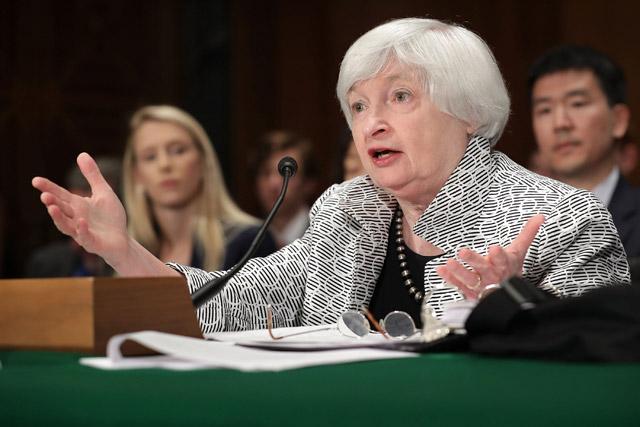You are here
US recovery incomplete — Fed chief
By Reuters - Jul 15,2014 - Last updated at Jul 15,2014
WASHINGTON — The US economic recovery remains incomplete, with a still-ailing job market and stagnant wages justifying loose monetary policy for the foreseeable future, Federal Reserve (Fed) Chair Janet Yellen told a Senate committee on Tuesday.
In a strong defence of the central bank's current stance, Yellen said early signs of a pickup in inflation aren't enough for the Fed to accelerate its plans for raising interest rates, a move currently expected in the middle of next year.
That could change, with interest rates rising sooner and faster, if data show labour markets improving more quickly than expected, she added.
But as it stands, "although the economy continues to improve, the recovery is not yet complete”, Yellen continued in semi-annual testimony before the Senate Banking Committee, repeating her focus on lagging labour force participation and weak wage growth as key to any conclusions about the economy's health.
"Too many Americans remain unemployed," Yellen indicated.
Fed relatively upbeat
Yellen presented a broad overview of an economy still in transition from the 2007-2009 economic crisis.
In an accompanying report, the Fed said its balance sheet would top out at $4.5 trillion when its bond-buying programme ends in October, a sign of how much stimulus the central bank has had to unleash to support the economy.
With another $2.6 trillion held in reserve by banks, the report said it "will not be feasible" for the Fed to rely on the traditional Fed Funds market to manage interest rates — a judgement implicit in its recent work on new interest rate tools.
Yellen said the economy continues to generate jobs and steady growth, but she added that Fed policy makers currently expect their preferred measure of inflation to stand at between 1.5 per cent and 1.75 per cent for 2014, short of the central bank's 2 per cent target.
The housing market remains weak, Yellen noted, and business investment less than hoped.
Fed chiefs are mandated by law to report to Congress twice a year on monetary policy, and the hearing on Tuesday was Yellen's second such appearance. Her first turned into a marathon grilling about her philosophy and views of the economy.
The Fed faces a complex agenda as it weans the US economy from the massive stimulus programmes put in place to fight the financial crisis.
Economic data has kept Fed policy makers relatively upbeat that the economy will make steady progress towards the central bank's goals.
But there is also the potential for serious division.
Some policy makers worry the Fed is falling behind the curve on rate hikes and that Yellen is taking too much of an impromptu approach to the interest rate decision.
In her prepared testimony, she held firm to her view that low labour force participation and other labour market statistics are evidence of slack that needs to be absorbed by stronger job growth, not just a sign of unavoidable demographic change.
For now, a more dovish approach holds sway at the central bank, with several officials saying they'd tolerate inflation higher than the 2 per cent target for a period of time in order to ensure growth is on track, wages are rising, and as many workers as possible have been drawn back into jobs.
Responding to questions from committee members, she said it would be a "mistake" for the Fed to adopt a strict rule for raising interest rates, something advocated by some lawmakers and Fed officials.
Also on Tuesday, the Fed voiced concern about stretched valuations in certain corners of the US equity markets, including the small cap, biotechnology and social media sectors.
The unusual comments from the Fed's monetary policy report — the first time in 14 years that the Fed has commented specifically on valuation of a particular equity sector — that accompanied Yellen's semi-annual testimony to Congress, hit stocks in riskier sectors of the market.
Yellen said in remarks to the Senate Banking Committee that valuations across equity markets remain generally in line with long-term averages, but the Fed's report said the forward price-to-earnings multiples for smaller companies and those in the biotechnology and social media sectors appear "high relative to historical norms".
Well-known names such as Facebook, LinkedIn and Yelp slipped after the news. Shares of Yelp Inc. were among the hardest hit, falling 4.3 per cent to $68.01 a share, and the Nasdaq Biotech Index also fell, losing 2 per cent.
"It's very unusual for the Fed chairman to take a microview of a specific industry group. Usually the comments are very top level. So I think the Fed is a little more in tune with what has been bothering the market. My thought is it's late, but not too late in terms of recognition," said Fred Dickson, chief market strategist at D.A. Davidson & Co. in Lake Oswego, Oregon.
Throughout 2013, social media and biotechnology shares were among the market's most popular names, posting massive gains as investors, particularly hedge funds, piled in. For example, the Global X Social Media ETF, which includes Facebook and LinkedIn among its holdings, rose 64 per cent in 2013.
Hedge funds were caught when those stocks slumped in late February in a sell-off that continued for several weeks. Those stocks rebounded in June, but most have failed to attain earlier heights. The SOCL exchange-traded fund is down 11.4 per cent in 2014.
Last week the equity market weakened, with notable slippage in small-cap names. The Russell 2000 has lost 4.6 per cent in the last seven trading days, while the Nasdaq Biotech index is off by 4.8 per cent.
"These are the sub-industries that have caused a lot of long- time stock watchers to scratch their heads," said Kim Forrest, senior equity research analyst, Fort Pitt Capital Group in Pittsburgh. "I'd say she'd like to deflate these bubbles with a little bit of stock talk."
The last mention of specific equity sectors appears in a Fed monetary policy report in July 2000, when it says that "growing unease about the lofty valuations reached by technology shares and rising default rates in the corporate sector may have given some investors a better appreciation of the risks of holding stocks in general”.
Art Hogan, chief market strategist at Wunderlich Securities in New York, said the comments also recall former Fed chairman Alan Greenspan's statement in 1996 during a speech, when he asked whether "irrational exuberance has unduly escalated asset values", which sparked a brief sell-off in stocks.
"Am I surprised? Absolutely! It's off the script," Hogan said. "It's not what we're used to and it's certainly not something that we ever got from Bernanke.”
Related Articles
WASHINGTON — Federal Reserve (Fed) Chair Janet Yellen conceded Wednesday the Fed's rate increase could hurt some emerging economies, but tha
WASHINGTON — Federal Reserve (Fed) Chair Janet Yellen said on Wednesday that even as the US economy grows stronger and employment expands, s
LONDON — Most Asian and European stock markets rose on Monday, tracking fresh records on Wall Street after forecast-busting US jobs data, as


















